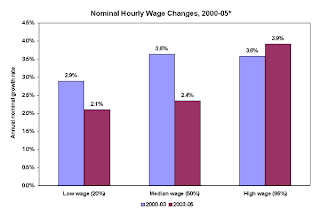Some of you may be watching the new Rachel Maddow show (and if you aren't, start). If you were last week, you may have seen a story about Barack Obama repeating the word "pie" twenty times in about two minutes. I'm happy to say, when he came to St. Louis Saturday, he shared that same story with all 100,000 of us. It actually is a really good story for all it's randomness at the beginning. Below is a transcript and the video (story is about 7 minutes in). See Momocrats for the other videos and more photos and impressions.
I was in Ohio last week and I was traveling with the governor there, Ted Strickland. We were on a bus tour talking about jobs. And we were working hard so, we got a little hungry. Decided we needed an afternoon snack. So I decided I needed some pie. Some of you may like cake, I like pie. Turns out Strickland likes pie too.
So we went into this little town, Georgetown Ohio, and found out where the best pie place was. It was this local diner. We went into the diner.
Now, I like sweet potato pie, but they did not have sweet potato pie. I like pecan pie, but there was no pecan pie. But they did have coconut cream pie, and I'll take some cream pie. Strickland, he wanted lemon merangue pie, they had that also.
So we order our pie and the people who are serving us, they want to take a picture with me because they say, "Our boss, he is a die hard Republican. So we just want to poke him a bit by taking this picture."
So while we're standing there cheezing and grinning, the owner walks in, with our pie. And I said, "How do you do sir? I understand you are a die hard Republican."
He said, "That's right."
I said, "How's business?"
He said "Not so good." He said "My customers can't afford to eat out right now."
I said, "Sir, who's been running the economy for the last eight years?"
He scratched his head and said, "I guess the Republicans have."
I said, "Sir, if you keep on hitting your head against a wall and it starts to hurt, do you decide at some point to stop?"
He said "You make a good point."
I said, "Why don't you go ahead and try voting Democratic this year. We can't do any worse than these other folks have been doing now."
Lets all stop hitting our head on the wall.




